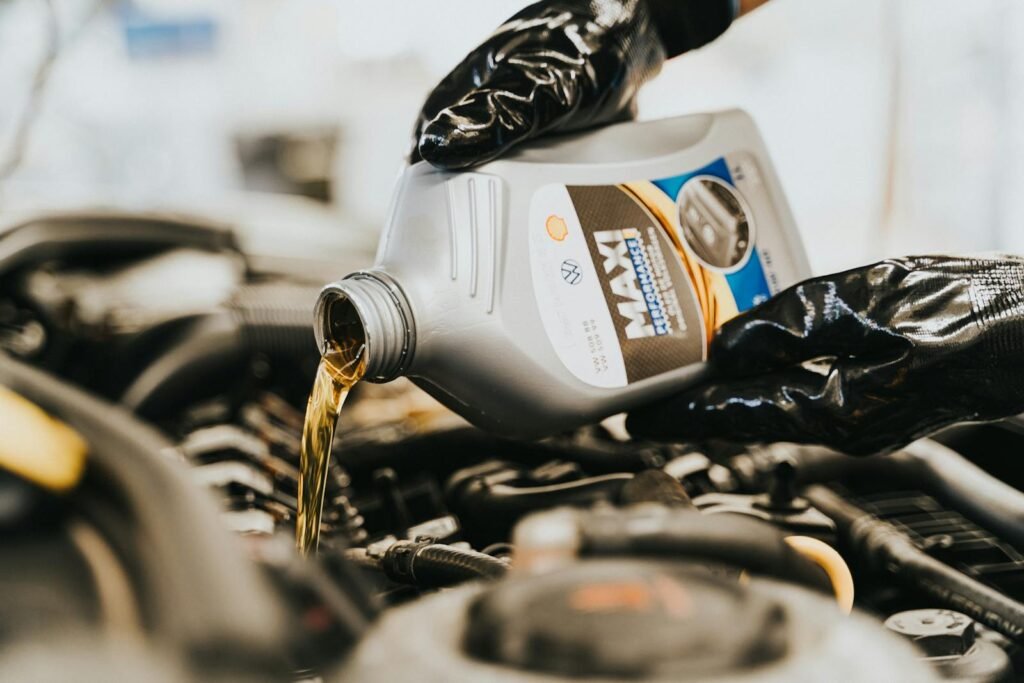Driving with an oil leak is dangerous and not recommended. An oil leak can cause severe engine damage.
Oil leaks occur for various reasons, including worn-out seals, gaskets, or damaged oil pans. Ignoring an oil leak can lead to serious problems, such as engine overheating and potential failure. Regularly check your vehicle for oil leaks to prevent costly repairs.
Addressing oil leaks promptly ensures the longevity and efficiency of your car. Mechanics can easily diagnose and fix oil leaks, providing peace of mind. Regular maintenance keeps your vehicle running smoothly and safely. Be proactive and take immediate action if you notice any signs of an oil leak. Your car and wallet will thank you.
Identifying Oil Leaks
Identifying an oil leak early can save you time and money. Knowing the signs helps you act fast and avoid bigger issues. This section will cover common signs and causes of oil leaks.
Common Signs
There are several signs that indicate your car might have an oil leak. Look out for these:
- Oil Spots: Small puddles or spots under your car.
- Burning Smell: A strong, burnt oil smell when the engine is hot.
- Low Oil Levels: Frequently needing to top up your oil.
- Warning Lights: Oil pressure or check engine light on the dashboard.
- Engine Smoke: Blue smoke from the exhaust pipe.
Causes Of Oil Leaks
Several issues can lead to oil leaks. Identifying the cause is crucial for fixing the problem. Here are common causes:
| Cause | Description |
|---|---|
| Worn-Out Gaskets | Old gaskets can crack and leak oil. |
| Damaged Oil Pan | Hitting road debris can damage the oil pan. |
| Loose Drain Plug | An improperly tightened drain plug can leak oil. |
| Faulty Oil Filter | A poorly installed filter can cause leaks. |
| Valve Seal Issues | Worn valve seals can cause oil leaks. |
By understanding these signs and causes, you can quickly identify oil leaks. This ensures your car stays in good condition.
Immediate Actions
Seeing an oil leak can be scary. Knowing what to do right away is important. Here are some steps to follow:
Checking Oil Levels
First, check the oil level. Use the dipstick in your engine. Follow these steps:
- Park on a flat surface.
- Turn off the engine.
- Wait a few minutes for the oil to settle.
- Pull out the dipstick and wipe it clean.
- Insert the dipstick back and pull it out again.
- Check the oil level on the dipstick.
If the oil level is low, add oil. Use the correct type of oil for your car. This info can be found in your car manual.
Temporary Fixes
A temporary fix can help stop the leak until you see a mechanic. Here are some options:
- Oil Stop Leak Products: These are additives. They can swell seals to stop leaks.
- Sealant Tape: This can be wrapped around a leaking hose.
- Oil Drain Plug Gasket: Sometimes, replacing the gasket can stop a leak.
Remember, these fixes are temporary. Make sure to visit a mechanic soon.
Risks Of Driving With An Oil Leak
Driving with an oil leak poses several serious risks. Oil leaks can result in significant damage to your vehicle and personal safety hazards. Understanding these risks can help you make informed decisions about vehicle maintenance.
Engine Damage
An oil leak can lead to serious engine damage. The engine relies on oil to stay lubricated and function properly. Without enough oil, the engine parts can grind against each other.
This friction can cause premature wear and tear. Over time, this can result in costly repairs or even engine failure. Regularly checking and maintaining oil levels can prevent these issues.
Fire Hazards
Oil leaks can also pose significant fire hazards. Leaked oil can drip onto hot engine parts. This can cause smoke or even flames.
If a fire starts, it can be very dangerous. It may even lead to the total loss of your vehicle. Ensuring no oil leaks can keep you safe from this risk.
Impact On Vehicle Performance
An oil leak can significantly impact your vehicle’s performance. Ignoring this issue can lead to severe consequences. Let’s explore how an oil leak affects efficiency and causes overheating issues.
Reduced Efficiency
An oil leak causes reduced efficiency in your vehicle. The engine needs oil to run smoothly. Without enough oil, friction increases. This makes the engine work harder. As a result, your vehicle consumes more fuel. Reduced efficiency leads to higher fuel costs. It also means your engine wears out faster.
| Issue | Effect on Performance |
|---|---|
| Oil Leak | Reduced Engine Efficiency |
| Increased Friction | Higher Fuel Consumption |
Overheating Issues
Oil helps in cooling the engine. With an oil leak, the engine lacks proper lubrication. This leads to overheating issues. Overheating can cause serious engine damage. The engine might even seize up. This makes your vehicle unsafe to drive. Overheating also leads to costly repairs.
- Engine lacks lubrication
- Leads to overheating
- Causes engine damage
- Makes vehicle unsafe
Environmental Concerns
Driving with an oil leak is not just a mechanical issue. It also poses significant environmental concerns. Leaking oil can cause harmful effects on the environment. It can contaminate soil, water, and harm wildlife. The consequences are far-reaching and serious.
Oil Spills
Oil spills from leaking vehicles can create hazardous situations. When oil leaks onto roads, it can easily wash into storm drains. These storm drains often lead directly to rivers and lakes. This can result in contaminated water bodies. Oil in water can be deadly for aquatic life. It forms a film on the water surface, blocking sunlight. This disrupts the oxygen supply for fish and plants.
Small oil spills may seem insignificant. But, they accumulate over time. Frequent leaks from multiple vehicles can lead to larger environmental damage. This makes driving with an oil leak a critical issue.
Legal Consequences
Driving a vehicle with an oil leak can have legal implications. Many regions have strict laws against environmental pollution. Leaking oil contributes to this pollution. If caught, you could face fines or other penalties. Legal consequences can vary based on location and severity. In some places, you may even face vehicle impoundment.
It’s essential to understand that environmental regulations are in place to protect our surroundings. Ignoring an oil leak is not just bad for your car. It’s also a legal risk. Ensuring your vehicle is well-maintained helps you avoid these legal issues.
Professional Inspection
Driving with an oil leak can lead to serious car damage. A professional inspection helps to identify and fix the issue swiftly. This step ensures safety for you and your car.
When To See A Mechanic
See a mechanic if you notice these signs:
- Oil spots under your car.
- Burning oil smell.
- Oil light on the dashboard.
- Engine overheating.
Diagnostic Procedures
Mechanics use several methods to diagnose an oil leak:
- Visual Inspection: The mechanic checks for visible oil stains.
- Oil Pressure Test: They measure the oil pressure to find leaks.
- UV Dye Test: A special dye is added to the oil. This dye helps find leaks under UV light.
- Engine Cleaning: The engine is cleaned to remove old oil stains. This helps in spotting new leaks.
Addressing an oil leak quickly can save you from costly repairs. An expert mechanic can ensure your car runs smoothly and safely.
Repair Options
If you notice an oil leak, fixing it quickly is crucial. Ignoring it can harm your car and lead to costly repairs. Here, we explore different repair options to address the problem.
DIY Solutions
For minor oil leaks, DIY solutions might suffice. They save money and are often quick fixes.
- Check the oil filter for tightness.
- Inspect the oil pan for visible damage.
- Use a stop leak additive to seal minor leaks.
Always ensure you have the right tools and parts. A repair manual for your car model can be very helpful.
Professional Repairs
For serious leaks, professional repairs are often necessary. They ensure the job is done right.
| Repair Type | Estimated Cost |
|---|---|
| Replacing Oil Pan Gasket | $150 – $500 |
| Replacing Valve Cover Gasket | $200 – $400 |
| Fixing Front Main Seal | $300 – $600 |
Professional mechanics have the expertise to diagnose complex issues. They can also prevent further damage to your engine.
By understanding your repair options, you can make an informed decision. Fixing an oil leak promptly ensures your car runs smoothly and safely.
Preventing Future Leaks
Preventing oil leaks keeps your car running smoothly. It also saves you money. Here are some tips to help you avoid future leaks.
Regular Maintenance
Regular maintenance is key to preventing oil leaks. Check your oil levels often. Look under your car for any signs of oil. A small drip can turn into a big problem.
Make sure to follow your car’s service schedule. This includes oil changes and inspections. A mechanic can spot potential issues early.
| Maintenance Task | Frequency |
|---|---|
| Oil Change | Every 3,000-5,000 miles |
| Engine Inspection | Every 6 months |
| Check Oil Level | Every month |
Using Quality Oil
Using quality oil makes a big difference. Cheap oil can break down faster. This can cause leaks and engine damage.
Look for oil that meets your car’s specifications. Check your owner’s manual for this information. Synthetic oils often provide better protection.
- Check the oil’s viscosity rating.
- Look for oils with high mileage formulas.
- Choose reputable brands.
Quality oil keeps your engine clean. It reduces sludge buildup. This helps prevent leaks and other issues.
Frequently Asked Questions
Is It Expensive To Fix A Oil Leak?
Fixing an oil leak can be affordable or expensive. Costs vary based on leak location and vehicle type. Simple fixes may cost $100-$200, while complex repairs could exceed $1,000. Always consult a mechanic for an accurate estimate.
Can You Drive A Parked Car With An Oil Leak?
Driving a car with an oil leak is risky. It can cause engine damage and potential breakdowns. Always fix leaks promptly.
Can I Drive Home With An Oil Leak?
Driving home with an oil leak is risky. It can damage your engine and lead to costly repairs.
Is A Small Oil Leak Ok?
A small oil leak is not okay. It can lead to serious engine damage if ignored. Always address leaks promptly.
Conclusion
Driving with an oil leak is risky and can damage your engine. Regular maintenance prevents costly repairs. Always address oil leaks promptly to ensure vehicle safety. Ignoring leaks can lead to severe mechanical issues. Prioritize your vehicle’s health for a smoother, longer-lasting ride.
Stay safe and responsible on the road.

